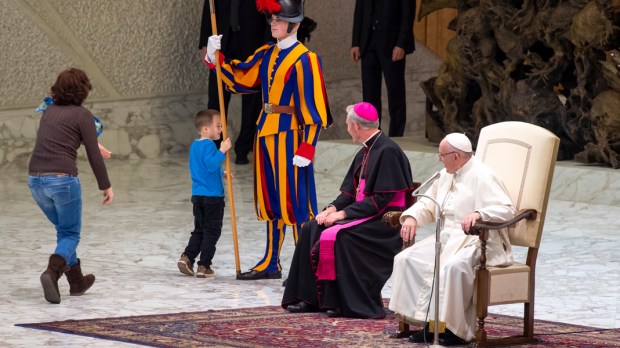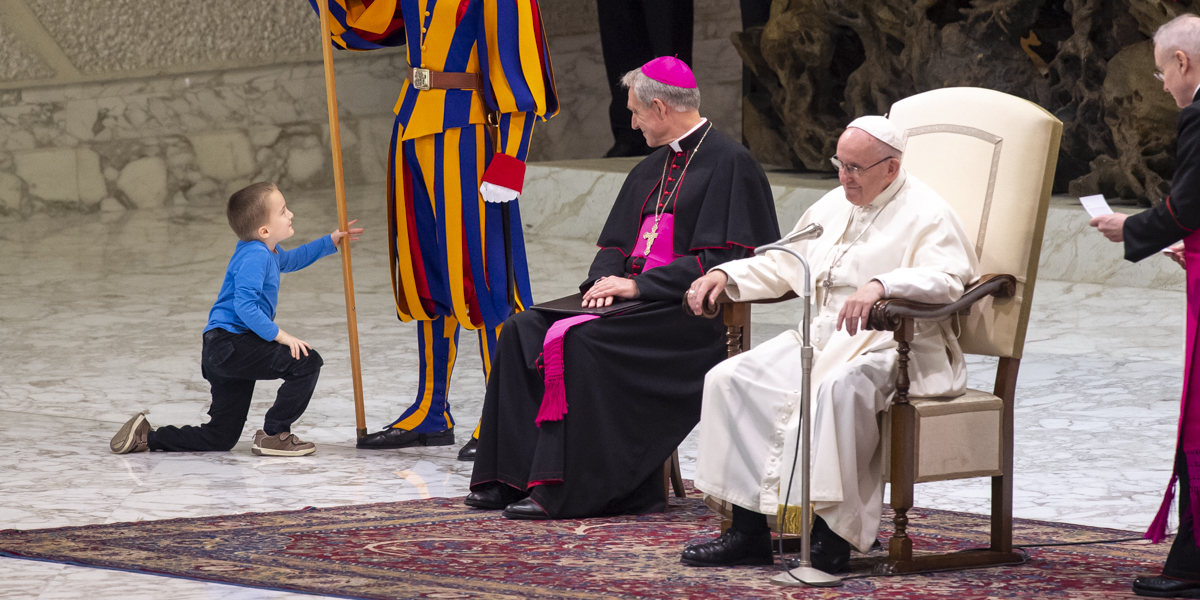Pope Francis today concluded his series on the Ten Commandments, speaking about the freedom that comes from having a heart full of the Holy Spirit’s desires. But Providence provided a perfect “tool” for the lesson: An adorable 7-year-old boy broke free from his mom and made it to the stage to explore the Swiss Guard’s uniform and gloved-hand (kudos to the Guard for maintaining his “at attention” will power!!).
Once Mom caught up to little Wenzel Eluney, she explained to the pope that they are from his own homeland of Argentina, though they live in Verona where Wenzel and his family receive therapy for his autism. Wenzel is unable to speak.
“Leave him, if he wants to play here,” the Holy Father told her. And then addressing Archbishop Georg Gänswein, he joked: “He’s Argentinean … undisciplined.” The boy continued to play on the stage for several moments, resisting the coaxing of his younger sister to return to his seat.
[Video link below]
During the blessing and his greetings to young people and the elderly, the pope commented on the boy. “Dear brothers and sisters. This child is non-verbal. He is not able to speak. But he knows how to communicate; he knows how to express himself. And he has something that has made me think. He is free! Undisciplined and free!” The crowd laughed and applauded.
Liberated life
As for the catechesis, the pope summarized his lessons on the Ten Commandments, saying the theme of desires enables a retracing of the whole catechesis cycle.(See below for links to each week’s catechesis).
We started out from gratitude as the basis of the relationship of trust and obedience: God, we have seen, does not ask for anything before giving us much more.
Francis explained how God’s invitation to obedience is “to redeem ourselves from the deception of idolatries that have so much power over us.”
If we seek fulfillment in idols, we end up empty and enslaved, he warned, while “what gives us stature and consistency is the relationship with He Who, in Christ, makes us children from His fatherhood.”
This is the secret to true repose, he said; it is a “liberated life” that leads to the “acceptance of our personal history and reconciles us with what, from infancy to the present, we have lived.” It brings us into relationship with others, with a call to “fidelity, generosity and authenticity.”
To live this way, we need a heart inhabited by the Holy Spirit, the pope continued.
I ask myself: how does this “transplant” of the heart, from the old heart to the new heart, take place? Through the gift of new desires (see Rom 8: 6); which are sown in us by the grace of God, especially through the Ten Commandments brought to completion by Jesus, as He teaches in the “discourse of the mountain” (cf. Mt 5: 17-48). In fact, in contemplating the life described in the Decalogue, which is a grateful, free, authentic, blessing, adult life, as guardian and lover of life, faithful, generous and sincere, we — almost without realizing it — find ourselves before Christ. The Decalogue is His “X-ray,” he traces it as a photographic negative that lets His face appear – like the Holy Shroud.
The Holy Spirit places His desires in our hearts, thereby making them fruitful: “To desire according to the Spirit, to desire with the rhythm of the Spirit, to desire with the music of the Spirit.”
Looking at Christ we see beauty, goodness and truth. And the Spirit generates a life which, following these desires, triggers hope, faith and love in us.
All of this leads us to a better understanding of what Jesus means when he says that he didn’t come to abolish the law but to fulfill it, the Holy Father said. “[W]hile the law according to the flesh was a series of prescriptions and prohibitions, according to the Spirit this same law becomes life.”
“It is no longer a norm but the very flesh of Christ, Who loves us, seeks us, forgives us, comforts us, and in His Body reconciles us in communion with the Father, which had been lost with the disobedience of sin,” he said.
Thus the “thou shalt nots” of the Commandments are actually about positive actions; they are invitations to make room in our hearts for others, to “all desires that sow positivity.”
From “no” we pass to “yes”: the positive attitude of a heart that opens with the power of the Holy Spirit.
The pope concluded by saying the Decalogue is this receiving of the Spirit and His desires:
If it is evil desires that ruin man (cf. Mt 15: 18-20), the Spirit lays down in our hearts His holy desires, which are the seed of new life (cf. 1 Jn 3. 9). New life in fact is not the titanic effort to be consistent with a norm, but new life is the Spirit of God Who begins to guide us to its fruits, in a happy synergy between our joy of being loved and His joy in loving us. The two joys meet: the joy of God to love us and our joy of being loved. This is what the Decalogue is for us Christians: to contemplate Christ so as to open up to receive His heart, to receive His desires, to receive His Holy Spirit.
See the Holy Father’s series on The Commandments here:
Pope points out what God says BEFORE he gives the Commandments
You probably don’t think of the 10 Commandments like this! Check out the pope’s amazing insight
Pope: Are you making yourself a human sacrifice to your idols?
Taking the name of the Lord in vain is much more than “OMG,” explains Francis
Vacation wears us out because we don’t know how to rest: Pope gives the answer
Pope explains how to find rest when you’re a slave to yourself
Scarred by your parents? Pope explains why you should still honor them
Abortion is like hiring a hitman, says pope in strong defense of 5th Commandment
What is this thing Pope Francis is suggesting for marriage prep?
Pope: It’s not love if it’s “only when it’s convenient”
Pope says 7th Commandment is about more than stealing. Am I breaking it?
“When there’s a lie, there cannot be love,” says Pope Francis


